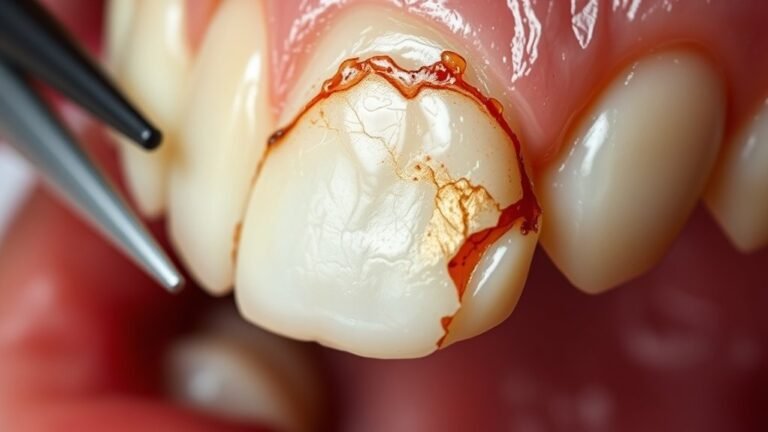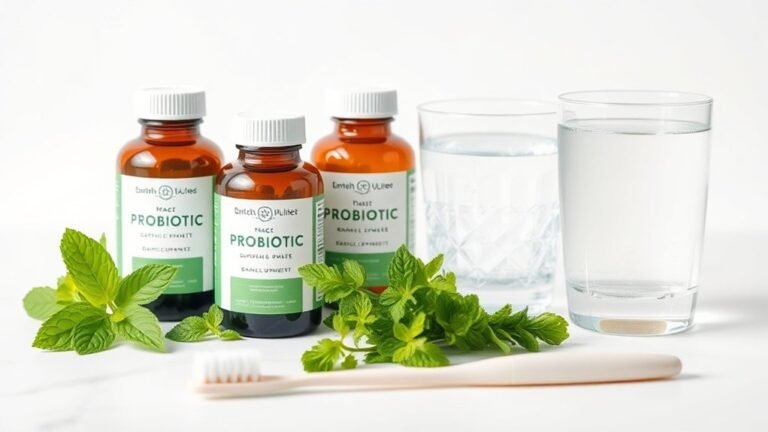What Foods Help Prevent Plaque Formation and Support Enamel Health
To prevent plaque formation and support enamel health, focus on foods rich in calcium and phosphorus like dairy and fish. Crunchy fruits and vegetables, such as apples and carrots, naturally clean your teeth and boost saliva production. Whole grains minimize cavity risk while fermented foods like yogurt and sauerkraut balance oral bacteria. Stay hydrated with water and herbal teas to protect enamel. Discover how these simple changes can enhance your dental routine for better oral health.
Key Takeaways
- Dairy products like milk, cheese, and yogurt are rich in calcium, essential for strong teeth and enamel health.
- Crunchy fruits and vegetables, such as apples and carrots, help clean teeth and stimulate saliva production to neutralize acids.
- Whole grains provide essential minerals and have a lower sugar impact, reducing plaque development and cavity risk.
- Fermented foods like yogurt and sauerkraut contain probiotics that balance oral bacteria and improve saliva production.
- Hydrating beverages, especially water and herbal teas, help rinse away food particles and support enamel protection.
Foods Rich in Calcium and Phosphorus
When you think about maintaining strong teeth, foods rich in calcium and phosphorus are essential allies. These minerals play a vital role in enhancing enamel health, which acts as your teeth’s protective barrier. Consuming dairy products like milk, cheese, and yogurt provides the calcium your body craves. Phosphorus, found in foods such as fish, meat, and nuts, works alongside calcium to strengthen enamel and support overall oral health. By incorporating these foods into your diet, you’ll help reduce plaque formation and boost cavity prevention. Remember, maintaining good dental hygiene practices, like regular brushing and flossing, complements your nutritional efforts. Prioritizing calcium and phosphorus-rich foods is a smart strategy for achieving long-lasting dental wellness.
Crunchy Fruits and Vegetables
Crunchy fruits and vegetables act as natural toothbrushes, providing a satisfying crunch while promoting oral health. These foods for teeth, like apples, carrots, and celery, help in plaque removal by stimulating saliva production, which neutralizes harmful acids. A healthy oral microbiome thrives on fiber-rich produce, supporting gum health and reducing the risk of cavities. Incorporating these crunchy options into your balanced diet can greatly enhance your overall dental care routine. While dietary supplements may help, nothing beats the natural benefits of fresh fruits and vegetables. So, the next time you snack, reach for something crunchy to keep your smile bright and healthy. Make these choices a habit for lasting enamel protection and improved oral hygiene.
Whole Grains and Their Benefits
In addition to incorporating crunchy fruits and vegetables, including whole grains in your diet can further support your oral health. Whole grains, such as brown rice, quinoa, and whole wheat bread, are rich in essential minerals that promote healthy gums and can help combat dental plaque. They also have a lower sugar impact compared to refined grains, reducing the risk of cavities. Plus, whole grains support hydration, which is vital for maintaining saliva production and oral probiotics, essential for a balanced mouth ecosystem.
| Benefit | Description | Impact on Oral Health |
|---|---|---|
| Mineral Content | Rich in minerals like magnesium and zinc | Strengthens teeth and gums |
| Low Sugar Impact | Minimizes plaque development | Reduces cavity risk |
| Hydration Support | Promotes saliva production | Fights bacteria effectively |
Fermented Foods for Oral Health
Fermented foods, rich in probiotics, play an essential role in enhancing oral health. They help balance bacteria in your mouth, reducing harmful strains and promoting healthy ones. This balance can lead to improved saliva production, which naturally aids in tartar prevention and reduces oral inflammation. Incorporating these foods into your diet can complement your oral care products, like fluoride toothpaste.
Here are three beneficial fermented foods:
- Yogurt – Contains live cultures that help fight harmful bacteria.
- Sauerkraut – Packed with probiotics that support a healthy oral microbiome.
- Kimchi – Rich in nutrients and probiotics, it can also promote saliva production.
Adding these foods can greatly support your enamel health and overall oral hygiene.
Hydrating Beverages That Support Enamel
While many people focus on solid foods for dental health, hydrating beverages are equally important for supporting enamel. Water is the best choice, as it helps rinse away food particles and promotes dental cleaning. Herbal teas, rich in antioxidants, can also provide protective benefits. For a boost of vitamins, consider smoothies made with leafy greens and fruit; they’re not just invigorating but also nourish your enamel. Be cautious with acidic drinks, as they can erode enamel over time. If you enjoy fruit juices, opt for 100% natural varieties and drink them in moderation. Incorporating mouthwash with fluoride into your routine after brushing can further protect your enamel while enhancing your overall dental health.
Frequently Asked Questions
How Often Should I Consume These Enamel-Supporting Foods?
You should aim to include enamel-supporting foods in your diet daily. Balance is key—try to consume a variety of these foods at each meal to maximize their benefits for your dental health consistently.
Can I Take Supplements Instead of Eating These Foods?
You can take supplements, but they shouldn’t replace whole foods. Real foods provide essential nutrients and additional benefits, like fiber. Aim for a balanced diet while considering supplements as a complement, not a substitute.
Are There Any Foods That Worsen Plaque Formation?
Yes, sugary snacks, sodas, and refined carbohydrates can worsen plaque formation. They feed harmful bacteria in your mouth, leading to acid production that erodes enamel. Limiting these foods helps maintain better oral health and prevent plaque buildup.
How Does Sugar Consumption Affect Enamel Health?
Sugar’s like a villain for your enamel, attacking it relentlessly! It fuels harmful bacteria, leading to acid production that erodes your teeth. Cutting down on sugar protects your enamel and keeps your smile shining bright.
Is It Safe to Use Mouthwash After Eating These Foods?
Yes, it’s safe to use mouthwash after eating, but wait about 30 minutes. This allows your saliva to neutralize acids and strengthens enamel, making mouthwash more effective without disrupting your oral pH balance.
Conclusion
Incorporating these enamel-friendly foods into your diet can be your knight in shining armor against plaque formation. Think of calcium-rich options, crunchy fruits, whole grains, and fermented foods as your allies in maintaining oral health. Remember, just like the legendary quest for the Holy Grail, achieving ideal enamel health takes effort and dedication. By making these simple dietary choices, you’ll not only protect your teeth but also enjoy a healthier smile for years to come.






